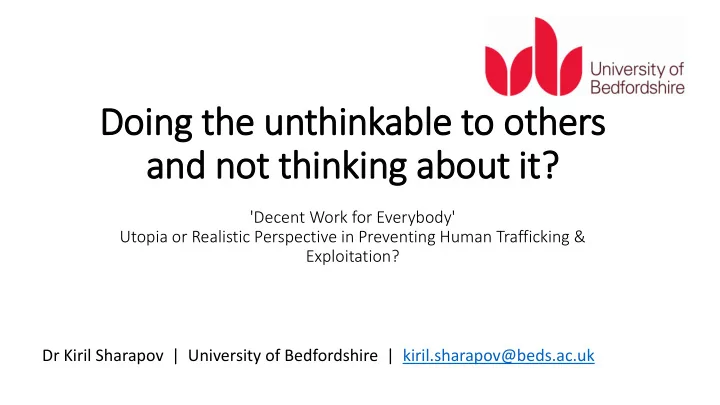

Doing the unthinkable to others and not thinking about it it? 'Decent Work for Everybody' Utopia or Realistic Perspective in Preventing Human Trafficking & Exploitation? Dr Kiril Sharapov | University of Bedfordshire | kiril.sharapov@beds.ac.uk
‘We must learn that passively to accept an unjust system is to cooperate with that system, and thereby to become a participant in its evil’ (Martin Luther King 1963: 6) • SYSTEM?! • Philip Zimbardo: 1971 Stanford prison experiment - http://www.prisonexp.org • ‘The Lucifer Effect: Understanding How Good People Turn Evil’ (Zimbardo 2007)
Circle Limit IV (Heaven and Hell) M.C. Escher July 1960 48.2 x 53 cm; image: 41.9 cm diameter woodcut in black and taupe on laid japan paper Gift of George Escher, Mahone Bay, Nova Scotia, 1983 National Gallery of Canada https://www.gallery.ca/en/see/collections/artwork.php?mkey=592
The Anti-intellectualism of (anti) human trafficking discourse • The EU and national anti-trafficking metrics: the number of victims rescued, and the number of criminals identified and convicted. • A very specific embodiment of victims – almost innately passive, broken, used and disempowered (meeting the ‘benchmark of victimhood’ to be recognised as such) • A very specific embodiment of perpetrators - ‘dangerous brown men’ (Ghargi Bhattacharyya 2008) – gendered, racialized and ‘ Othered ’ – inherently bad and evil criminals and gangs driven by profit and operating across borders
Person, Situation and System (Zimbardo 2007) • Extending the notions of victims, perpetrators and, also, of bystanders and survivors (a) individuals who are exploited, and people who move and exploit them; (b) consumers and people who benefit directly or indirectly from such exploitation; and (c) governments and private capital that allow such exploitation to happen
Fundamental Attribution Error (Zimbardo 2007) • … locates the inner qualities of people (criminals and victims, consumers and bystanders) as the main source of their actions (Zimbardo 445). • Person, Situation and System approach: Person Situation System
Changing or preventing ‘evil’ • Understanding, on an individual level , what strengths, virtues, and vulnerabilities individuals bring into a given situation ’ • Recognising the complexity of situational forces : change or avoid a situation, rather than changing the people in the situation: ‘public health approach’ replacing ‘medical approach’: modify the environment rather than ‘cure’ • Challenging the real power of the System (hidden behind a veil of secrecy and ideology) – unless we change the system, behavioral change will be transitory and situational change will be just an illusion • Example: 2013 Rana Plaza collapse – 38 people charged with murder, consumer awareness, fashion retailers’ commitment etc. but no systemic change, so exploitation continues
Panel: Spotlights & Reality Checks • Julia Planitzer: Searching for accountability of the private sector for trafficking in human beings • Idar Smedsrud: 'Fighting human trafficking is a question of our everyday decisions' • Alexandra Malangone: 'Decent work for us, Slovaks (in Austria, UK and elsewhere), not for them - third-country nationals (in Slovakia). • Markus Zingerle: 'It’s not easy to bring cases of Human Trafficking for the purpose of labour exploitation to the court – but with joined efforts it`s possible.
Recommend
More recommend